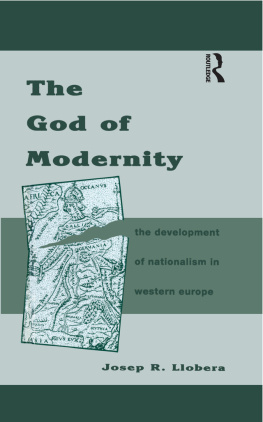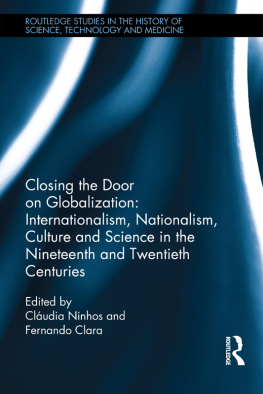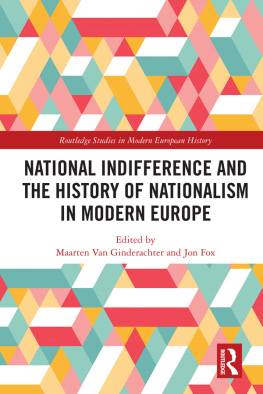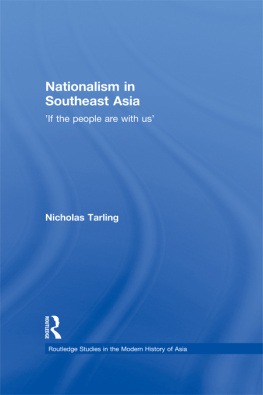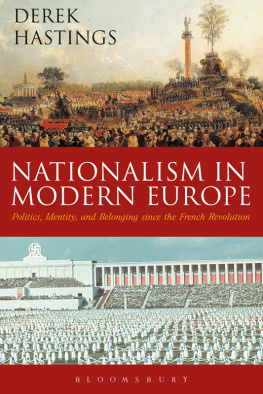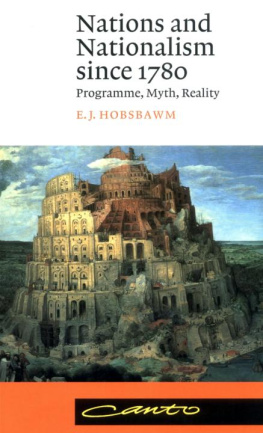Nationalism in Europe since 1945
Studies in European History Series
Series Editors: | Julian Jackson, Peter Wilson and Sarah Badcock |
Catherine Baker | The Yugoslav Wars of the 1990s |
Jeremy Black | A Military Revolution? Military Change and European Society, 15501800 |
T. C. W. Blanning | The French Revolution: Class War or Culture Clash? (2nd edn) |
John Breuilly | The Formation of the First German Nation-State, 18001871 |
Peter Burke | The Renaissance (2nd edn) |
Markus Cerman | Villagers and Lords in Eastern Europe, 13001800 |
Michael L. Dockrill & |
Michael F. Hopkins | The Cold War 19451991 (2nd edn) |
William Doyle | The Ancien Rgime (2nd edn) |
William Doyle | Jansenism |
Andy Durgan | The Spanish Civil War |
Geoffrey Ellis | The Napoleonic Empire (2nd edn) |
Donald A. Filtzer | The Khrushchev Era |
Karin Friedrich | Brandenburg-Prussia, 14661806 |
Mary Fulbrook | Interpretations of the Two Germanies, 19451990 (2nd edn) |
Andr Gerrits | Nationalism in Europe since 1945 |
Graeme Gill | Stalinism (2nd edn) |
Hugh Gough | The Terror in the French Revolution (2nd edn) |
Peter Grieder | The German Democratic Republic |
John Henry | The Scientific Revolution and the Origins of Modern Science (3rd edn) |
Stefan-Ludwig Hoffmann | Civil Society, 17501914 |
Henry Kamen | Golden Age Spain (2nd edn) |
Beat Kmin | The Communal Age in Western Europe, c.11001800 |
Richard Mackenney | The City-State, 15001700 |
Spencer Mawby | The Transformation and Decline of the British Empire |
Andrew Porter | European Imperialism, 18601914 |
Roy Porter | The Enlightenment (2nd edn) |
Roger Price | The Revolutions of 1848 |
James Retallack | Germany in the Age of Kaiser Wilhelm II |
Richard Sakwa | Communism in Russia |
Geoffrey Scarre & | Witchcraft and Magic in 16th- and 17th-Century Europe |
John Callow | (2nd edn) |
R. W. Scribner & |
C. Scott Dixon | The German Reformation (2nd edn) |
Robert Service | The Russian Revolution, 19001927 (4th edn) |
Jeremy Smith | The Fall of Soviet Communism, 19851991 |
David Stevenson | The Outbreak of the First World War |
Peter H. Wilson | The Holy Roman Empire, 14951806 (2nd edn) |
Oliver Zimmer | Nationalism in Europe, 18901940 |
Studies in European History
Series Standing Order ISBN 9780-333793657
(outside North America only)
You can receive future titles in this series as they are published by placing a standing order. Please contact your bookseller or, in case of difficulty, write to us at the address below with your name and address, the title of the series and the ISBN quoted above.
Customer Services Department, Macmillan Distribution Ltd,
Houndmills, Basingstoke, Hampshire, RG21 6XS, UK
Nationalism in Europe
since 1945
Andr Gerrits

Andr Gerrits 2016
All rights reserved. No reproduction, copy or transmission of this publication may be made without written permission.
No portion of this publication may be reproduced, copied or transmitted save with written permission or in accordance with the provisions of the Copyright, Designs and Patents Act 1988, or under the terms of any licence permitting limited copying issued by the Copyright Licensing Agency, Saffron House, 610 Kirby Street, London EC1N 8TS.
Any person who does any unauthorized act in relation to this publication may be liable to criminal prosecution and civil claims for damages.
The author has asserted his right to be identified as the author of this work in accordance with the Copyright, Designs and Patents Act 1988.
First published 2016 by
PALGRAVE
Palgrave in the UK is an imprint of Macmillan Publishers Limited, registered in England, company number 785998, of 4 Crinan Street, London, N1 9XW.
Palgrave Macmillan in the US is a division of St Martins Press LLC, 175 Fifth Avenue, New York, NY 10010.
Palgrave is a global imprint of the above companies and is represented throughout the world.
Palgrave and Macmillan are registered trademarks in the United States, the United Kingdom, Europe and other countries.
ISBN 9781137337870
This book is printed on paper suitable for recycling and made from fully managed and sustained forest sources. Logging, pulping and manufacturing processes are expected to conform to the environmental regulations of the country of origin.
A catalogue record for this book is available from the British Library.
A catalog record for this book is available from the Library of Congress.
Introduction
The large majority of studies on nationalism either discuss nationalism in abstracto or identify it with its most extreme expressions only, in the form of hot nationalist conflicts and wars. This book on nationalism in Europe after the Second World War is both narrower and wider in scope. It talks about nationalism as a political phenomenon. Political nationalism is defined as political action plausibly guided by a distinct idea of the nation or a strong sense of national identity. This is largely irrespective of the form and content of political action. It can either be tolerant or intolerant, left wing or right wing, defensive or offensive, governmental or oppositional. Simultaneously, however, this study takes a wider scope than is usual in publications on nationalism, by linking nationalism with major processes of change in post-war Europe. Nationalism is discussed in relation to processes of European integration, to the development of the welfare state, to the theory and practice of communist rule in Central and Eastern Europe and to the rise of globalization and immigration after the Cold War. This approach has the advantage of situating and contextualizing nationalism in real-world changes. Nationalism never comes alone. But it has disadvantages too. Nationalist ambitions typically merge with other concerns, which gives nationalism its multifaceted nature and much of its popular and political allure, but which also makes it difficult to isolate from other beliefs, motives and justifications of political behaviour. Euroscepticism, anti-communism and support for or critique of the national welfare state or multiculturalism can be inspired by a range of political beliefs, besides nationalist ideas. Still, situating the national issue in the larger context of post-war European history reveals more about the actual role and relevance of political nationalism than limiting the discussion to only an abstract or theoretical level.
Next page

